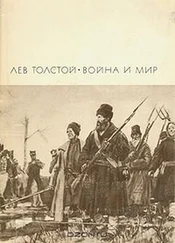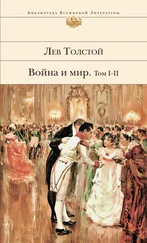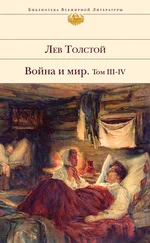| Prince Andrew turned his horse and galloped back to Grunth to find Prince Bagration. |
Князь Андрей повернул лошадь и поскакал назад в Грунт отыскивать князя Багратиона. |
| He heard the cannonade behind him growing louder and more frequent. |
Сзади себя он слышал, как канонада становилась чаще и громче. |
| Evidently our guns had begun to reply. |
Видно, наши начинали отвечать. |
| From the bottom of the slope, where the parleys had taken place, came the report of musketry. |
Внизу, в том месте, где проезжали парламентеры, послышались ружейные выстрелы. |
| Lemarrois had just arrived at a gallop with Bonaparte's stern letter, and Murat, humiliated and anxious to expiate his fault, had at once moved his forces to attack the center and outflank both the Russian wings, hoping before evening and before the arrival of the Emperor to crush the contemptible detachment that stood before him. |
Лемарруа (Le Marierois) с грозным письмом Бонапарта только что прискакал к Мюрату, и пристыженный Мюрат, желая загладить свою ошибку, тотчас же двинул свои войска на центр и в обход обоих флангов, надеясь еще до вечера и до прибытия императора раздавить ничтожный, стоявший перед ним, отряд. |
| "It has begun. |
"Началось! |
| Here it is!" thought Prince Andrew, feeling the blood rush to his heart. |
Вот оно!" думал князь Андрей, чувствуя, как кровь чаще начинала приливать к его сердцу. |
| "But where and how will my Toulon present itself?" |
"Но где же? Как же выразится мой Тулон?" думал он. |
| Passing between the companies that had been eating porridge and drinking vodka a quarter of an hour before, he saw everywhere the same rapid movement of soldiers forming ranks and getting their muskets ready, and on all their faces he recognized the same eagerness that filled his heart. |
Проезжая между тех же рот, которые ели кашу и пили водку четверть часа тому назад, он везде видел одни и те же быстрые движения строившихся и разбиравших ружья солдат, и на всех лицах узнавал он то чувство оживления, которое было в его сердце. |
| "It has begun! |
"Началось! |
| Here it is, dreadful but enjoyable!" was what the face of each soldier and each officer seemed to say. |
Вот оно! Страшно и весело!" говорило лицо каждого солдата и офицера. |
| Before he had reached the embankments that were being thrown up, he saw, in the light of the dull autumn evening, mounted men coming toward him. |
Не доехав еще до строившегося укрепления, он увидел в вечернем свете пасмурного осеннего дня подвигавшихся ему навстречу верховых. |
| The foremost, wearing a Cossack cloak and lambskin cap and riding a white horse, was Prince Bagration. |
Передовой, в бурке и картузе со смушками, ехал на белой лошади. Это был князь Багратион. |
| Prince Andrew stopped, waiting for him to come up; Prince Bagration reined in his horse and recognizing Prince Andrew nodded to him. |
Князь Андрей остановился, ожидая его. Князь Багратион приостановил свою лошадь и, узнав князя Андрея, кивнул ему головой. |
| He still looked ahead while Prince Andrew told him what he had seen. |
Он продолжал смотреть вперед в то время, как князь Андрей говорил ему то, что он видел. |
| The feeling, "It has begun! Here it is!" was seen even on Prince Bagration's hard brown face with its half-closed, dull, sleepy eyes. |
Выражение: "началось! вот оно!" было даже и на крепком карем лице князя Багратиона с полузакрытыми, мутными, как будто невыспавшимися глазами. |
| Prince Andrew gazed with anxious curiosity at that impassive face and wished he could tell what, if anything, this man was thinking and feeling at that moment. |
Князь Андрей с беспокойным любопытством вглядывался в это неподвижное лицо, и ему хотелось знать, думает ли и чувствует, и что думает, что чувствует этот человек в эту минуту? |
| "Is there anything at all behind that impassive face?" Prince Andrew asked himself as he looked. |
"Есть ли вообще что-нибудь там, за этим неподвижным лицом?" спрашивал себя князь Андрей, глядя на него. |
| Prince Bagration bent his head in sign of agreement with what Prince Andrew told him, and said, |
Князь Багратион наклонил голову, в знак согласия на слова князя Андрея, и сказал: |
| "Very good!" in a tone that seemed to imply that everything that took place and was reported to him was exactly what he had foreseen. |
"Хорошо", с таким выражением, как будто всё то, что происходило и что ему сообщали, было именно то, что он уже предвидел. |
| Prince Andrew, out of breath with his rapid ride, spoke quickly. |
Князь Андрей, запихавшись от быстроты езды, говорил быстро. |
| Prince Bagration, uttering his words with an Oriental accent, spoke particularly slowly, as if to impress the fact that there was no need to hurry. |
Князь Багратион произносил слова с своим восточным акцентом особенно медленно, как бы внушая, что торопиться некуда. |
| However, he put his horse to a trot in the direction of Tushin's battery. |
Он тронул, однако, рысью свою лошадь по направлению к батарее Тушина. |
| Prince Andrew followed with the suite. |
Князь Андрей вместе с свитой поехал за ним. |
| Behind Prince Bagration rode an officer of the suite, the prince's personal adjutant, Zherkov, an orderly officer, the staff officer on duty, riding a fine bobtailed horse, and a civilian-an accountant who had asked permission to be present at the battle out of curiosity. |
За князем Багратионом ехали: свитский офицер, личный адъютант князя, Жерков, ординарец, дежурный штаб-офицер на энглизированной красивой лошади и статский чиновник, аудитор, который из любопытства попросился ехать в сражение. |
| The accountant, a stout, full-faced man, looked around him with a naive smile of satisfaction and presented a strange appearance among the hussars, Cossacks, and adjutants, in his camlet coat, as he jolted on his horse with a convoy officer's saddle. |
Аудитор, полный мужчина с полным лицом, с наивною улыбкой радости оглядывался вокруг, трясясь на своей лошади, представляя странный вид в своей камлотовой шинели на фурштатском седле среди гусар, казаков и адъютантов. |
| "He wants to see a battle," said Zherkov to Bolkonski, pointing to the accountant, "but he feels a pain in the pit of his stomach already." |
- Вот хочет сраженье посмотреть, - сказал Жерков Болконскому, указывая на аудитора, - да под ложечкой уж заболело. |
| "Oh, leave off!" said the accountant with a beaming but rather cunning smile, as if flattered at being made the subject of Zherkov's joke, and purposely trying to appear stupider than he really was. |
- Ну, полно вам, - проговорил аудитор с сияющею, наивною и вместе хитрою улыбкой, как будто ему лестно было, что он составлял предмет шуток Жеркова, и как будто он нарочно старался казаться глупее, чем он был в самом деле. |
| "It is very strange, mon Monsieur Prince," said the staff officer. (He remembered that in French there is some peculiar way of addressing a prince, but could not get it quite right.) |
- Tr?s dr?le, mon monsieur prince, [Очень забавно, мой господин князь,] - сказал дежурный штаб-офицер. (Он помнил, что по-французски как-то особенно говорится титул князь, и никак не мог наладить.) |
| By this time they were all approaching Tushin's battery, and a ball struck the ground in front of them. |
В это время они все уже подъезжали к батарее Тушина, и впереди их ударилось ядро. |
| "What's that that has fallen?" asked the accountant with a naive smile. |
- Что ж это упало? - наивно улыбаясь, спросил аудитор. |
| "A French pancake," answered Zherkov. |
- Лепешки французские, - сказал Жерков. |
| "So that's what they hit with?" asked the accountant. "How awful!" |
- Этим-то бьют, значит? - спросил аудитор. -Страсть-то какая! |



